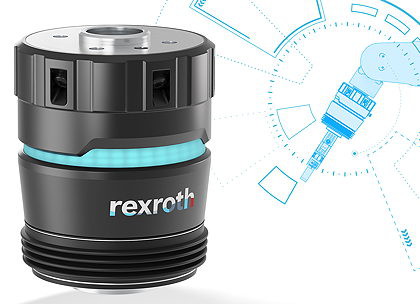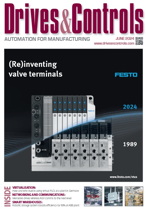- Home » News » Technology News
Effector that gives robots a human touch is ‘a paradigm shift’

At the recent Hannover Messe, Bosch Rexroth unveiled a sensor-based compensation module that gives robots and Cartesian linear systems a “human-like sensitivity” and, according to the company, marks “a paradigm shift in factory automation”. The Smart Flex Effector allows complex assembly processes that previously could only be automated at great expense or not at all, to be automated at a “reasonable” cost.
Processes that have been difficult to control can now be automated, optimised and monitored by retrofitting them with the new module. Using kinematics that work independently with six degrees of freedom, the touch-sensitive module detects possible position deviations and transmits them to the robot controller to allow active compensation. Typical applications include joining processes with tight tolerances, complex assemblies, or difficult handling tasks. The device is claimed to minimise errors and rejects, and to make teaching and commissioning easier and faster.
Rexroth says that the effector will open up new applications for machine-builders and users, which could only be partially achieved – or not at all – using previous technologies such as passive compensation systems, force-torque sensors and visual systems. The potential applications range from process automation and quality monitoring, to teaching and controlled handling of objects.
According to Rexroth, the range of functions combined in the single, retrofittable component removes the limits of factory automation and will open up completely new perspectives, while using existing production resources. It can be added to existing production cells without major conversion work. Similarly, new production systems and flexible assembly cells can be implemented more easily and cost-effectively, because the Smart Flex Effector reduces the demands on the accuracy of the systems.
The device can be used to correct complex processes with tight tolerances: for example, positional deviations between tools and workpieces, or complex joining processes.
It can also cut the time previously needed for teaching. Using 6D position detection, the robot controller reads the exact coordinates of pick-and-place points directly. Repeated automated teaching during operation is thus possible. Robots can also be taught simply positioning them by hand.

The effector can also be used to detect position deviations and to determine the exact position of an object. Robots can pick up objects precisely, position them in a controlled manner and place or sort them reliably. Even items made of glass or other sensitive materials can be handled safely. The compensation module can be brought to a zero position and locked electromechanically for fast transfer runs.
Bosch has already used the effector in pilot applications in its own plants. For example, in one application that could not be automated previously, a robot equipped with the Smart Flex Effector places glass plates into refrigerators so sensitively that they do not tilt or break. In another, the effector is being used to position PCBs in engine control units without bending their sensitive soldering pins. This apparently simple assembly process is actually complex to implement. However, by continuously referencing positions and transmitting the correction data, the robot handles the PCBs as sensitively as a human hand.
The effector, which can handle loads of up to 6kg, is said to be easy to install. For a passive compensation functions, it is simply screwed to a robot flange and gripper. Locking functions and data transmission are available after connecting to power and control. The effector has an RS-485 port and I/O interface for exchanging data.
"The Smart Flex Effector enables a new level of automation, with which mechanical engineering and production companies can economically map significantly more processes and fundamentally simplify their system design without having to resort to expensive high technology,” says Michael Danzberger, product manager for the Smart End Effectors. “The small additional costs for the equalisation system pay for themselves quickly.”
Bosch Rexroth: Twitter LinkedIn Facebook





